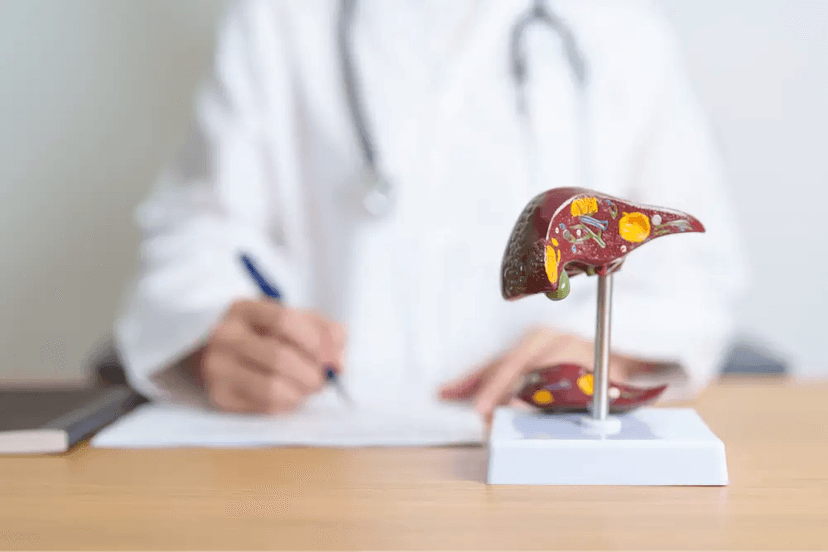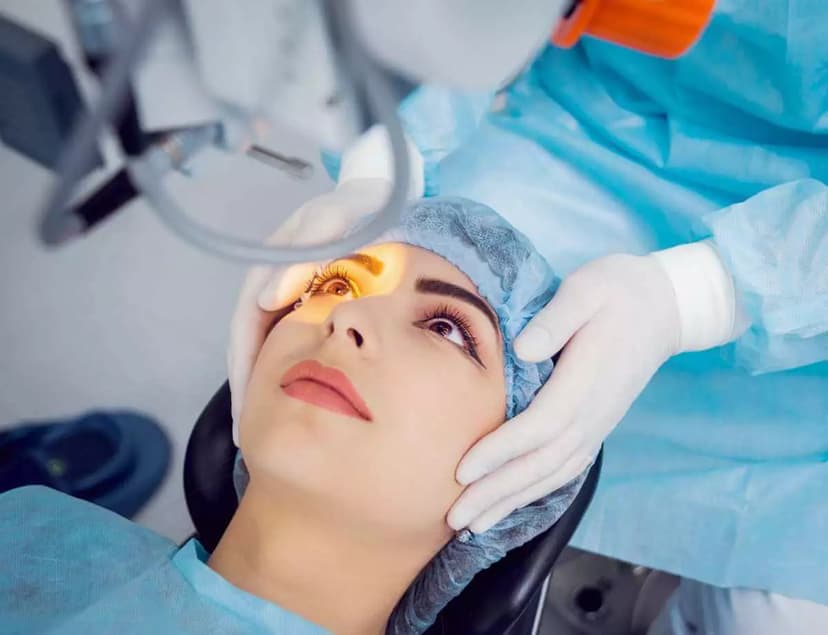Contents
Liver cirrhosis treatment in Turkey has become one of the most sought-after healthcare services for patients worldwide due to the country’s advanced medical standards, affordable costs, and internationally accredited hospitals. While cirrhosis is a progressive and irreversible condition, Turkey offers high-quality diagnostic and therapeutic options, including liver transplantation, which remains the only definitive treatment for advanced stages of the disease.
Leading hospitals such as Florence Nightingale, Acıbadem, and Anadolu Medical Center are equipped with cutting-edge technology and experienced transplant surgeons like Dr. Ahmet Atasever and Dr. Yıldıray Yüzer, achieving success rates exceeding 95 percent. The average cost of liver transplant surgery in Turkey ranges between 55,000 and 75,000 USD, which is 50 to 70 percent lower than in the United States, United Kingdom, or Canada, without compromising on care quality.
Through A-Medical, patients receive full assistance throughout their journey — from selecting the best clinic and coordinating medical documentation to arranging travel, accommodation, and translation services. With transparent pricing, verified clinics, and personalized care, A-Medical ensures that patients seeking liver cirrhosis treatment in Turkey experience a safe, affordable, and well-organized medical process from consultation to recovery.
A-Medical: Your Partner for Liver Cirrhosis Treatment Turkey
At A-Medical, we go beyond ordinary medical facilitation services to provide exceptional support and care for your journey to health. Here's why you should choose us:
- No Cost, All Value: Enjoy our expert assistance for free. We believe in transparent, professional services without additional charges. You only pay for your medical procedure.
- Verified Clinics & Doctors Only: We rigorously verify the credentials of every doctor and clinic we work with to ensure your safety and satisfaction.
- 24/7 Support: Throughout your medical journey, our dedicated manager will stay in touch to provide continuous support and promptly resolve any issues that arise.
- Travel to Treatment Under One Roof: We streamline your medical and travel arrangements transparently and professionally, making the process hassle-free.
What is cirrhosis?
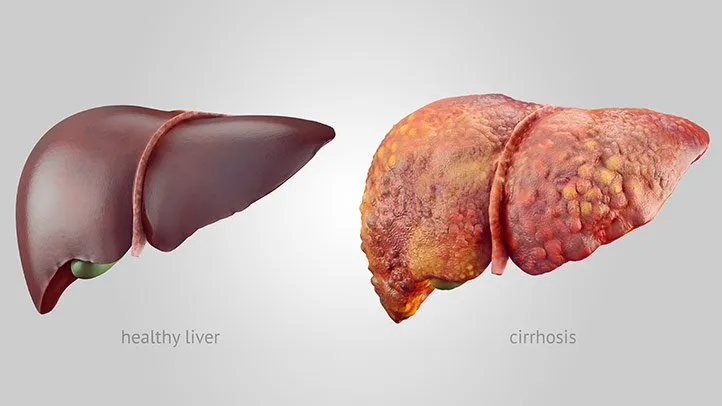
Cirrhosis is an advanced form of liver damage that can arise from various diseases or, at times, for unknown reasons. Common causes include fatty liver or excessive alcohol consumption. As cirrhosis develops, the liver undergoes structural changes, impairing its normal functions. This marks the onset of the cirrhosis process. With progression, the liver gradually hardens and shrinks due to a decline in functioning liver cells. This hampers blood flow to the hardened tissues, prompting the formation of new vascular pathways. These events further worsen the condition, leading to liver failure.
What are the symptoms of cirrhosis?
Cirrhosis is a long-term and progressive liver disease. In its early stages, symptoms may be mild, but as liver damage increases, they become more severe. Common symptoms of cirrhosis include:
- Appetite and weight loss
- Nausea and vomiting
- Constant fatigue
- Swelling in the legs (edema)
- Abdominal swelling due to acid accumulation
- Muscle loss
- Anemia
- Itching
- Jaundice
- Blood clotting issues
- Menstrual irregularities in women
- Bruising and skin bleeding
- Nervousness
- Constipation and gas issues
- Feeling of stomach heaviness
What causes cirrhosis?
Cirrhosis can result from chronic alcohol use, but it's not the sole factor. Other contributors include chronic viral hepatitis (such as Hepatitis B and Hepatitis C), fatty liver, and obesity. In rare cases, cirrhosis can develop due to:
- Non-alcoholic fatty liver disease
- Obstruction and inflammation of the bile ducts
- Autoimmune hepatitis, where the body produces antibodies against its own tissues
- Long-term use of heavy drugs
- Excessive intake of iron and copper minerals
- Chronic heart failure
What are the stages of cirrhosis?
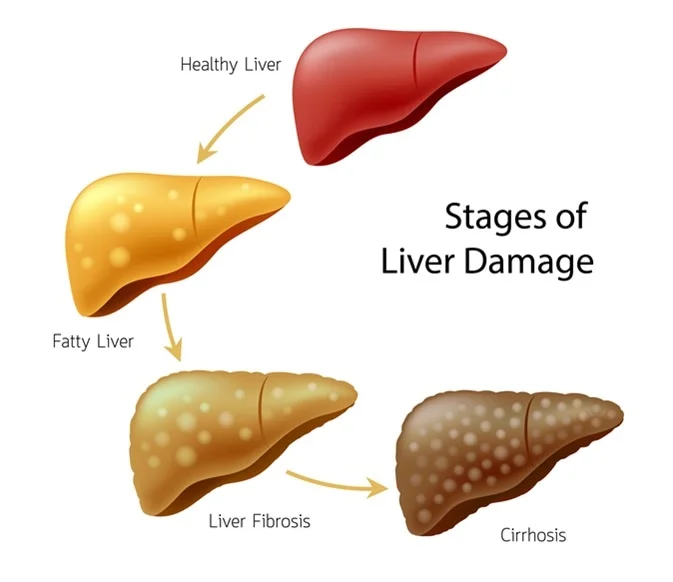
Cirrhosis is categorized into two stages: compensated and decompensated cirrhosis, depending on the presence of symptoms. If diagnosed early, decompensated cirrhosis can potentially transition into compensated cirrhosis. Let's break down these phases:
- Compensated cirrhosis stage: At this point, no cirrhosis symptoms are evident, and the patient experiences no discomfort. While there is scar tissue in the liver, it hasn't progressed enough to cause noticeable symptoms.
- Decompensated cirrhosis stage: Symptoms like jaundice and abdominal fluid accumulation (ascites) become apparent in this phase. It's a critical stage. Early diagnosis and intervention can lead to reversal, but if it's detected late, the only viable option may be a liver transplantation. Late-stage decompensated cirrhosis poses a serious threat to life.
How is cirrhosis diagnosed?
Cirrhosis often starts without noticeable symptoms, and some individuals may only discover it during a routine check-up.
If a doctor suspects cirrhosis during a routine check-up or medical examination, they will begin by asking about your medical history. Information on alcohol consumption, drug use, and overall lifestyle is crucial in assessing liver health.
A physical examination will also be conducted to assess the condition of your liver. Cirrhosis is typically identified through routine blood tests or examinations, and additional laboratory and imaging tests may be requested for confirmation.
The common methods used for cirrhosis diagnosis include:
- CBC blood tests
- Liver function test (ALT-AST)
- Ultrasonography tests
- Biopsy (rare)
Cirrhosis treatment
Reversing cirrhosis entirely is not currently possible, but certain treatments aim to minimize permanent liver damage, halt the progression of cirrhosis, and alleviate symptoms. The doctor determines the treatment based on the cause and stage of cirrhosis.
The main objective of cirrhosis treatments is to address the underlying cause and prevent further harm. This involves:
- Alcohol cessation: If alcohol is the culprit, immediate discontinuation is crucial. The doctor may suggest a treatment plan for alcohol addiction.
- Weight loss: For cirrhosis caused by liver fat accumulation, losing weight is recommended.
- Antiviral medication: If Hepatitis B or C is the cause, antiviral medication is necessary.
- Symptom relief: Medication can be prescribed to alleviate symptoms like itching, pain, and fatigue.
In severe cases, a liver transplant may be the last resort. This is a complex and lengthy process, involving placement on a waiting list for a deceased organ donor's liver or, in some cases, receiving a portion of a liver from a living donor.
Cirrhosis treatment in Turkey
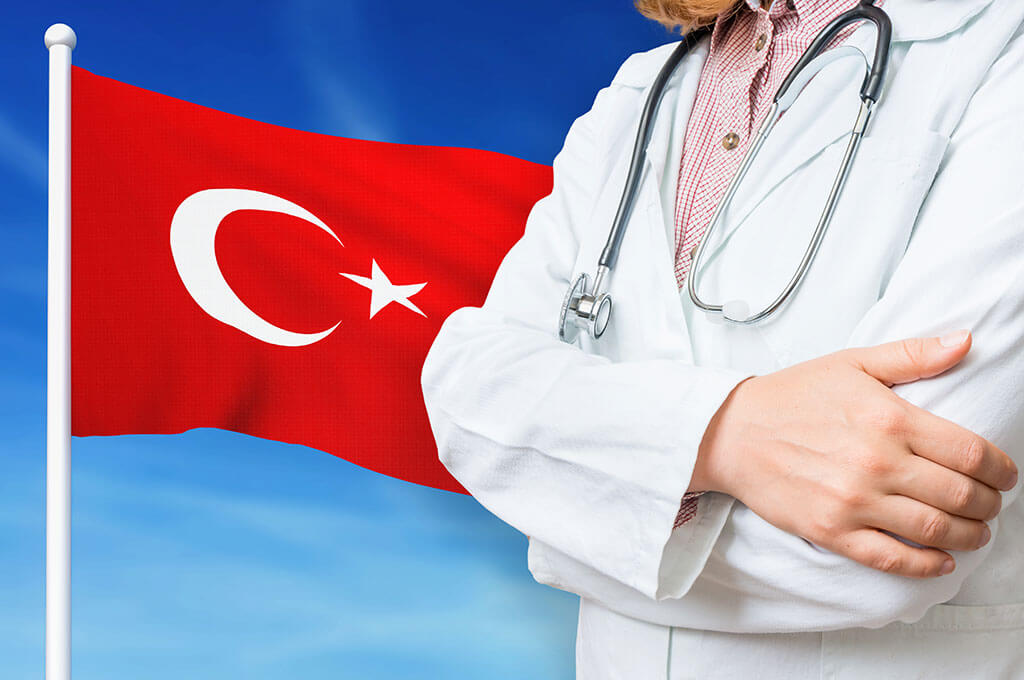
People from around the world like to get liver cirrhosis treatment in Turkey. Turkey has good clinics that can find and treat liver cirrhosis. They can also do liver transplant surgeries for people with serious liver cirrhosis. The costs are low, and the medical care is really good.
People from Europe especially like getting liver cirrhosis treatment in Turkey. In Europe, the treatment costs a lot. It's super expensive in places like the United States, Canada, and the United Kingdom. But in Turkey, the treatment, which includes liver transplantation, is way cheaper—like 70% less than in the USA, UK, and Canada.
Best Clinics for Liver Cirrhosis Treatment in Turkey

Florence Nightingale Hospital
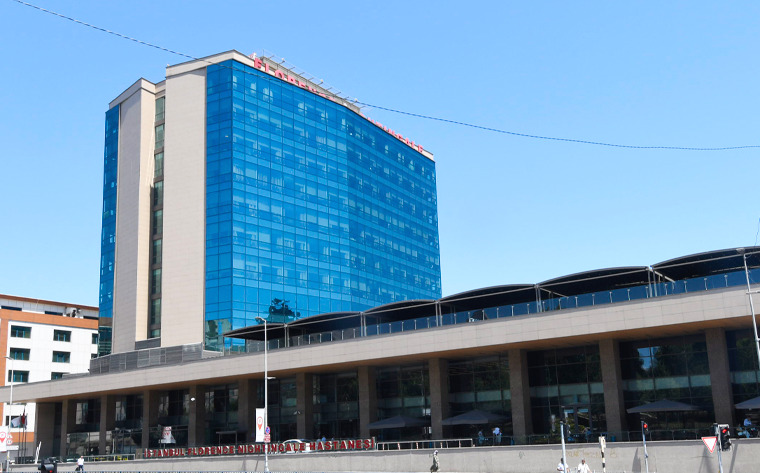
Florence Nightingale Hospital is one of the top choices for liver cirrhosis treatment in Turkey, particularly for patients requiring liver transplantation. The hospital is JCI-accredited and recognized for its advanced surgical infrastructure and experienced transplant team. Renowned surgeons such as Dr. Ahmet Atasever and Dr. Yıldıray Yüzer perform complex liver transplant surgeries here, achieving over 95% success rates. Florence Nightingale combines world-class care with ethical medical practices, making it a trusted center for international patients.
Acıbadem Healthcare Group

Acıbadem is one of Turkey’s most respected healthcare networks, known for providing comprehensive liver cirrhosis treatment and liver transplant surgeries. With internationally certified doctors and modern facilities, Acıbadem offers cutting-edge diagnostic and surgical technologies. The hospital ensures patient safety through personalized treatment plans and multidisciplinary medical teams that manage the entire recovery process with precision and care.
Anadolu Medical Center

Affiliated with Johns Hopkins Medicine (USA), Anadolu Medical Center delivers high-level medical services for liver cirrhosis patients. The hospital’s advanced infrastructure, strict infection control protocols, and expert transplant surgeons make it one of the leading centers for liver transplantation in Turkey. International patients benefit from seamless coordination, language support, and transparent pricing, ensuring a smooth treatment experience.
Liver transplant surgery for the treatment of cirrhosis in Turkey
In Turkey, the primary way to treat liver cirrhosis is through liver transplantation. Numerous clinics in the country excel in this surgery. Our patients underwent liver transplant procedures at Florence Nightingale Hospital, a JCI-accredited clinic in Turkey. Dr. Ahmet ATASEVER and Dr. Yıldıray Yüzer conducted the surgeries. Florence Nightingale Hospital stands out for achieving a success rate of over 95%, making it the top choice for liver transplant surgery in Turkey.
Liver transplant surgery in Turkey costs between $55,000 and $75,000 for treating liver cirrhosis. This is 50-70% cheaper than in the USA, UK, and Canada. Despite the lower cost, the medical service quality remains high, ensuring patients are satisfied when leaving the hospital after the procedure.
Why choose A-Medical?
At A-Medical, we help international patients to get Liver Cirrhosis Treatment in Turkey in an affordable, high-quality, and easy way. We help you with everything from informing you about Liver Cirrhosis Treatment in Turkey to managing your treatment process from scratch.
As A-Medical medical tourism company, we offer you the following advantages during your treatment abroad:
- Choosing the most suitable clinic for you
- Making your travel plan
- Obtaining the procedure at discounted prices
- Sending your medical documents to the clinic abroad with their translation
- Arranging a doctor's appointment (video conferencing if necessary)
- Support regarding tickets and visas
- Translator support
- Transfer support
- Establishing communication
- Service to benefit from campaigns and discounts
